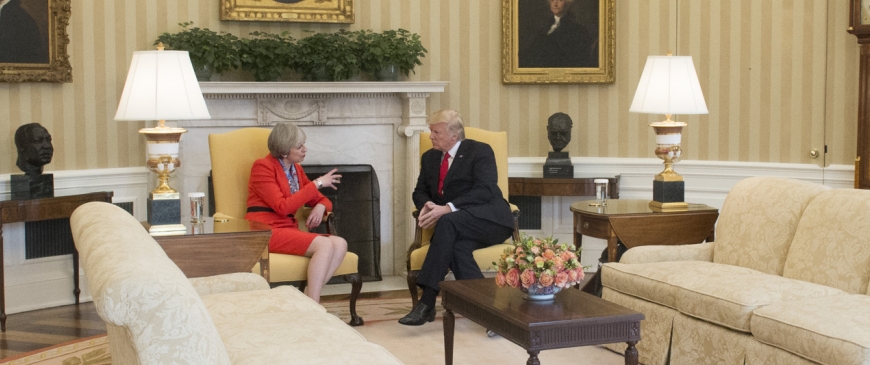
A quick trade deal with the US after Brexit is less likely than we think
It is many a Brexiteer’s fantasy: In 2019, shortly after the UK formally leaves the EU, Theresa May welcomes Donald Trump to Downing Street to ink a trade pact. Out with the old, in with the new, and the ‘special relationship’ standing tall. But how likely is that scenario? A trade deal would certainly be politically meaningful for both sides. For Trump, who is facing pressure over his protectionist rhetoric, it would be an opportunity to boost his pro-trade credentials. While Theresa May could use it to show that Britain has trade options beyond the EU. The prospect of a deal with the US could also boost her hand when it comes to bargaining with Brussels over Brexit. But for all the bluster about a quick trade deal, there are several reasons why it won’t be so easy.
First, it’s important to remember that the UK is by far the junior partner in any talks that will take place. Trump’s economic nationalism means he sees trade negotiations in transactional, zero-sum terms. One reason Trump torpedoed the Trans-Pacific Partnership – a deal his predecessor had negotiated with 11 other Pacific countries – is that he thinks it is better to leverage US economic muscle in bilateral talks than entangle the country in a multilateral web of trade partnerships. In a US-UK negotiation, the UK would be alone, not backed by the collective weight of 450 million other European consumers. Of course, while that might benefit the speed of trade talks, there’s a reason why bilateral deals are in Donald Trump’s interests: they give the US much bigger clout, particularly when matching up with smaller markets. An independent and nimble UK might strike deals quicker than the EU would do. But it would face more difficulties getting the US trade colossus to budge on key issues like market access.
This leads to a second point. The US will ask a lot and give little. Trump likes trade surpluses but dislikes trade deficits. According to the ONS, the UK had its largest trade surplus in 2015, worth £39.4bn, with the United States. It is reasonable to assume that the US will insist on deeper market access to correct this imbalance. Team Trump may push to open up parts of the National Health Service (NHS) to American healthcare providers, and seek greater access to Britain’s agricultural sector. UK farmers are already under pressure from higher input costs due to a weaker pound and cuts in EU subsidies after Brexit.
It is less clear what the UK can ask for in return. One issue the UK pushed for during the EU-US talks about a transatlantic trade and investment partnership (TTIP) was getting access to the American public procurement market. The Obama administration opened up parts of this lucrative market to Australia and so Trump might do the same for Britain. But Britain should not get its hopes up. The US federal government cannot force state governments to open their doors (the FTA with Australia does not extend to 19 of the 50 states). And America has some protectionist rules on federal government procurement (particularly the ‘Buy America’ act of 1982), not all of which are relaxed even for countries with an FTA with the US. It is improbable to think that a US president whose inaugural message was to ‘buy American and hire American’ will tackle this legislation.
Finally, the US will wait for the EU. The most important factor preventing a quick and meaningful British-American deal is that as long as the terms of trade between the UK and the EU are still under negotiation, the US will not know what preferential access to the UK market is really worth. After all, it matters a lot to a US investor if a British business can, or cannot, sell its goods or services into the EU free from tariffs, customs checks or red tape. Theresa May wants to sign a comprehensive trade agreement with the EU, but this will take several years to agree and ratify. And so, for the time being, Washington will be unable and unwilling to make concessions to London. Boris Johnson has said the UK will be ‘first in line‘ for a trade deal with the US. The only problem is that the line may not be moving anytime soon.
Rem Korteweg is a senior research fellow at the Centre for European Reform in London.
